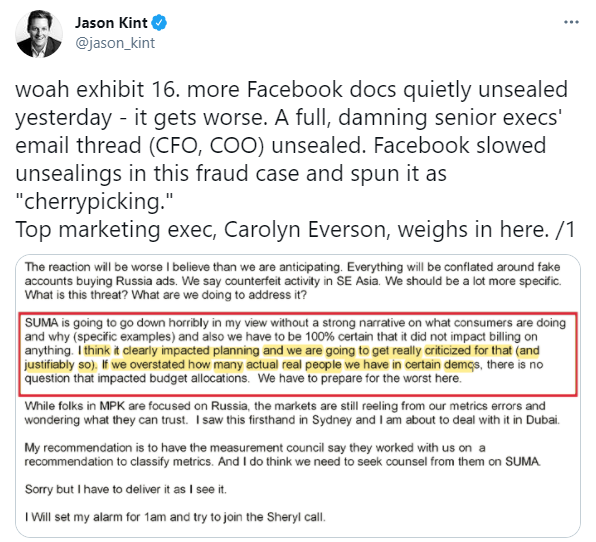Facebook exec: 'We have to prepare for the worst' over inflated reach fallout, court documents show

One Facebook employee stated in internal communications: “My question lately is: how long can we get away with the reach overestimation?”
A court case brought against Facebook in 2018, after Australian media revealed the platform’s “potential reach” figures were wildly overestimated, has exposed sensitive internal emails as Facebook scrambled to contain global fallout and minimise financial impact. These suggest Facebook was aware that "if we overstated how many actual real people we have in certain demos, there is no question that impacted budget allocations", and that it should "prepare for the worst."
What you need to know:
- A court case brought against Facebook by a business in California has prompted the release of a trove of internal documents after claims of inflated “potential reach” figures were widely reported.
- Further documents, including Facebook internal emails and memos have been unsealed this week.
- “We have to prepare for the worst here” wrote Facebook’s Global Business Group VP, Carolyn Everson in an email. "If we overstated how many actual real people we have in certain demos, there is no question that impacted budget allocations."
- Another VP from Facebook wrote: “I think there is a real chance this is a very bad moment for us – “Facebook lies about its user #s to get record profits””.
- Allegations are that Facebook knew for years its potential reach figures were inaccurate, which contributed to advertisers spending more money with them.
- Facebook says emails have been “cherry picked” to support the plaintiff’s case, and that advertisers are not billed on reach but on real clicks and impressions.
- Facebook also says the emails 'reflect a team working through a developing issue before reporting with recommendations to leadership'.
If we overstated how many actual real people we have in certain demos, there is no question that impacted budget allocations. We have to prepare for the worst here.
One of Facebook’s most senior marketing executives said the platform had to “prepare for the worst” after claims it had overstated the potential reach of its ads.
In internal emails released as part of an ongoing court case in California, Facebook’s Global Business Group VP, Carolyn Everson, wrote that the reaction to potentially inflated figures would be “worse I believe than we are anticipating”, and that company had to be “100% certain that it did not impact billing on anything”.
Facebook is facing a class action lawsuit in a California federal court brought by a small business that alleged the social media giant inflated its potential reach demographic figures.
The Financial Times reports the lawsuit claims Facebook’s figures included duplicate and fake accounts, that Facebook knew its figures were “misleading” but did nothing in order to “preserve its own bottom line”.
Facebook has argued advertisers are charged for actual clicks and impressions, and that potential reach is a “helpful planning tool”.
Documents filed in the case reveal Facebook executives were seriously concerned about the scandal.
“I think it clearly impacted planning and we are going to get really criticised for that (and justifiably so),” Everson wrote in an email on October 25, 2017.
“If we overstated how many actual real people we have in certain demos, there is no question that impacted budget allocations.
“We have to prepare for the worst here”.
Facebook says the emails are old and have been “cherry picked” to suit the plaintiff’s allegations in the court case.
The documents come as a new Australian report accuses Facebook of approving ads for alcohol, vaping, gambling and dating aimed specifically at teenagers.
I think there is a real chance this is a very bad moment for us – “Facebook lies about its user #s to get record profits.”
Anomaly first found in Australia
The case was filed in 2018, months after AdNews journalist Arvind Hickman broke the story that Facebook claimed its platform could reach more people than the census officially said lived in the country.
In mid-2017, AdNews reported that Facebook claimed it could reach 1.7 million more 15- to 39-year old users than were alive in Australia.
At the time, Facebook responded weakly that it was 'always looking to improve estimates'.
“Reach estimations are based on a number of factors, including Facebook user behaviours, user demographics, location data from devices and other factors," Facebook told AdNews.
"They are designed to estimate how many people in a given area are eligible to see an ad a business might run. They are not designed to match population or census estimates. We are always working to improve our estimates.”

Everson’s emails highlight that Facebook's response had not gone down well.
“I just left Sydney where there is so much concern over the reach estimate/census discrepancy (they broke this story months ago and feel our response has been completely lacking),” she wrote.
“The reporters I met with are extremely confused on this and in fact one said to me “aren’t you a platform that knows real people?” I explained we know we need to provide more clarity around the differences in numbers and we are working hard to do that.”
Facebook said in a statement to Mi3 the emails show a team working through a developing issue before providing recommendations to leadership.
It’s clear these old emails are being cherry-picked to fit the plaintiffs’ narrative. They reflect a team being asked to work through a developing issue and then provide recommendations to leadership — nothing more.
How do you solve a problem like negative publicity
The emails highlight some of the efforts by Facebook to counter the negative publicity around the alleged inflated reach figures.
An email from then-VP of Product, Ami Vora, dated October 26, 2017, noted: “I think there is a real chance this is a very bad moment for us – “Facebook lies about its user #s to get record profits.””
She asked two senior employees if they could corral clients to “speak on our behalf about how they’re not worried about fake accounts because they’re getting real results”, or focus on SMBs that are “doing unquestioned great work”.
Exhibits available for all to see
Seventy seven exhibits were released publicly on April 23 in the case DZ Reserve v. Facebook, Inc.
- In Exhibit 16 (Attachment 18), a chain of internal emails featuring Carolyn Everson’s comments is posted in full.
- In one, Exhibit 34 (Attachment 36), a member of the Targeting Team stated that if a plan to reduce duplicate accounts were implemented, “people will drop ~10% Globally”.
- In Exhibit 49 (Attachment 51), a Facebook employee stated: “My question lately is: how long can we get away with the reach overestimation?”
- In Exhibit 55 (Attachment 57), former Facebook exec Yaron Fidler says on October 10, 2018, of the inclusion of ineligible accounts: “This is a lawsuit waiting to happen.”
One notice of motion filed in the case in June last year puts it bluntly:
“Facebook executives knew these lies were responsible for significant revenues – at the expense of advertisers … In sum, Facebook admits it intentionally lied to make money – the textbook definition of fraud.”
Facebook said in its statement: “It’s clear these old emails are being cherry-picked to fit the plaintiffs’ narrative. They reflect a team being asked to work through a developing issue and then provide recommendations to leadership — nothing more.
“As we’ve always said, ‘potential reach’ is a helpful planning tool that advertisers are not billed on. We explain what it is and the factors that may influence its calculation in our ads interfaces.”
Mi3 asked the The Australian Competition and Consumer Commission whether it planned to investigate Facebook's overstating of its audience, or whether those claims potentially constitute misleading or deceptive behaviour against Australian advertisers.
In a statement, the ACCC responded:
"The ACCC is closely monitoring overseas cases and developments involving digital platforms as part of its ongoing inquiries (Digital Platform Services Inquiry and Digital Advertising Services Inquiry).
"While the ACCC generally does not comment on potential or current investigations, the ACCC notes that under the Australian Consumer Law, businesses are required to not engage in conduct involving false, misleading or deceptive representations."
